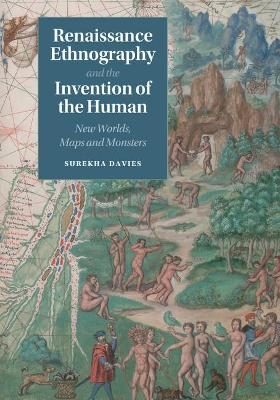
Renaissance Ethnography and the Invention of the Human
Cambridge University Press (Verlag)
978-1-108-43182-8 (ISBN)
Giants, cannibals and other monsters were a regular feature of Renaissance illustrated maps, inhabiting the Americas alongside other indigenous peoples. In a new approach to views of distant peoples, Surekha Davies analyzes this archive alongside prints, costume books and geographical writing. Using sources from Iberia, France, the German lands, the Low Countries, Italy and England, Davies argues that mapmakers and viewers saw these maps as careful syntheses that enabled viewers to compare different peoples. In an age when scholars, missionaries, native peoples and colonial officials debated whether New World inhabitants could – or should – be converted or enslaved, maps were uniquely suited for assessing the impact of environment on bodies and temperaments. Through innovative interdisciplinary methods connecting the European Renaissance to the Atlantic world, Davies uses new sources and questions to explore science as a visual pursuit, revealing how debates about the relationship between humans and monstrous peoples challenged colonial expansion.
Surekha Davies is a cultural historian and historian of science at Western Connecticut State University. Her interests include exploration, observational sciences, cultural encounters, monstrosity and the history of mentalities c.1400–1800. Formerly a British Library Curator and a Leverhulme Early Career Fellow, she is a Founding Editor of the series 'Maps, Spaces, Cultures' (Brill). She has held fellowships at the John Carter Brown Library, the Folger Shakespeare Library, the Library of Congress and the Newberry Library, and been funded by the American Historical Association and the American Philosophical Society. Her publications include articles in The Historical Journal, History and Anthropology, Renaissance Studies and The Journal of Early Modern History.
Introduction: Renaissance maps and the concept of the human; 1. Climate, culture or kinship? Explaining human diversity c.1500; 2. Atlantic empires, map workshops and Renaissance geographical culture; 3. Spit-roasts, barbecues and the invention of the Brazilian cannibal; 4. Trade, empires and propaganda: Brazilians on French maps in the age of François I and Henri II; 5. Monstrous ontology and environmental thinking: Patagonia's giants; 6. The epistemology of wonder: Amazons, headless men and mapping Guiana; 7. Civility, idolatry and cities in Mexico and Peru; 8. New sources, new genres and America's place in the world, 1590–1645; Epilogue; Bibliography; Index.
| Erscheinungsdatum | 28.08.2017 |
|---|---|
| Reihe/Serie | Cambridge Social and Cultural Histories |
| Zusatzinfo | Worked examples or Exercises; 60 Halftones, unspecified; 60 Halftones, black and white |
| Verlagsort | Cambridge |
| Sprache | englisch |
| Maße | 180 x 255 mm |
| Gewicht | 730 g |
| Themenwelt | Geschichte ► Allgemeine Geschichte ► Neuzeit (bis 1918) |
| Geisteswissenschaften ► Geschichte ► Regional- / Ländergeschichte | |
| Geschichte ► Teilgebiete der Geschichte ► Kulturgeschichte | |
| Geschichte ► Teilgebiete der Geschichte ► Sozialgeschichte | |
| Naturwissenschaften ► Geowissenschaften ► Geografie / Kartografie | |
| ISBN-10 | 1-108-43182-8 / 1108431828 |
| ISBN-13 | 978-1-108-43182-8 / 9781108431828 |
| Zustand | Neuware |
| Informationen gemäß Produktsicherheitsverordnung (GPSR) | |
| Haben Sie eine Frage zum Produkt? |
aus dem Bereich


